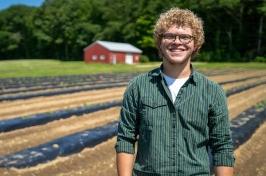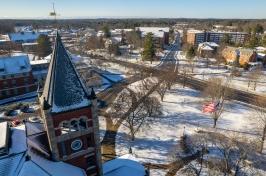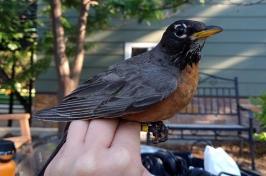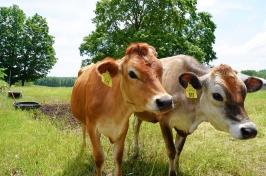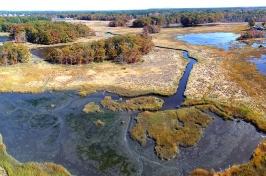研究发现奶农接受减少甲烷的海藻饲料
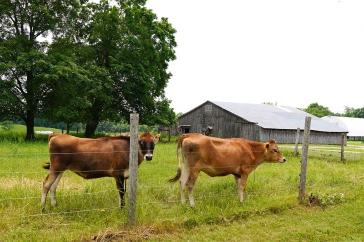
DURHAM, N.H. — New England’s dairy industry continues to evolve in response to significant market challenges that include a decreased demand for milk and higher production and land costs. However, there is also ongoing evidence that organic dairy farming can provide environmental benefits — such as reducing methane emissions — which could further differentiate their products as well as help qualify farms for new government initiatives to reduce methane through innovative management practices. Researchers from the University of New Hampshire collaborated with researchers in Maine to find evidence that nearly half of organic dairy farmers would be willing to pay a little extra for methane-reducing seaweed feed but would only consider if it was cost effective, aligned with existing feeding practices and would qualify them for government policies and subsidies.
“奶农的目标是把他们的农场经营成利润丰厚的企业,” said Andre Brito, associate professor of dairy cattle nutrition and management and a scientist at UNH’s New Hampshire Agricultural Experiment Station. “额外的费用需要认真考虑, 以及更多的数据和未来碳市场的有效实施.”
In the study, published in Frontiers in Veterinary Science, researchers surveyed 35 Maine organic dairy farmers, all of whom were familiar with seaweed-based feeds and a third of whom were already using such feeds on their farms. 近一半的受访者表示愿意付费, on average, 每头奶牛每天额外增加64美分用于减少甲烷的海藻饲料.
As part of the study, 研究人员在缅因州的沃尔夫颈部农业中心进行了一项喂养试验 & 在 环境中,他们给22头奶牛喂食含有6%红海藻的饲料(C. crispus) — locally harvested from the Maine coastline — from February through May of 2021. The results of the trial showed that adding this seaweed to the cows' diet reduced methane production by 13.9% without affecting milk production and quality.
“Maine is the birthplace of temperate seaweed farming in the United States and also supports organic certification of seaweeds,” said Nichole Price, a senior research scientist with the Bigelow Laboratory for Ocean Sciences and the director of the Bigelow Center for Seafood Solutions. “The close proximity of the nascent seaweed industry to organic dairy farms makes Maine the perfect testbed for this exciting line of inquiry.”
The survey also revealed that 93% of the farmers were more concerned about issues like labor shortages, infrastructure problems, rising costs and unstable supply chains, rather than climate change and regulation. This means that farmers would only consider using seaweed in their cows' diets if it is cost-effective and has additional benefits, while also aligning with existing feeding practices and receiving support from government policies and subsidies.
资金由美国农业部国家粮食和农业研究所和美国农业部提供.H. Agricultural Experiment Station.
Co-authors include lead author Diana Reyes, UNH; Jennifer Meredith, Colby College; Leah Puro, 沃尔夫颈部农业与环境中心; Katherine Berry, 沃尔夫颈部农业与环境中心; Richard Kersbergen, University of Maine Cooperative Extension; Kathy Soder, USDA; Charlotte Quigley, Bigelow Laboratory for Ocean Sciences; Michael Donihue, Colby College; and Dorn Cox, 沃尔夫颈部农业与环境中心.
Founded in 1887, the NH Agricultural Experiment Station at the UNH College of Life Sciences and Agriculture is UNH’s first research center and an elemental component of New Hampshire's land-grant university heritage and mission. We steward federal and state funding, 包括美国农业部国家食品和农业研究所的支持, to provide unbiased and objective research concerning diverse aspects of sustainable agriculture and foods, aquaculture, forest management, and related wildlife, natural resources, and rural community topics. 我们维护着伍德曼和金曼农艺和园艺研究农场, the Macfarlane Research Greenhouses, the Fairchild Dairy Teaching and Research Center, and the Organic Dairy Research Farm. Additional properties also provide forage, forests, and woodlands in direct support to research, teaching, and outreach.
The University of New Hampshire 激励创新,改变我们国家、民族和世界的生活. More than 16,000 students from 49 states and 82 countries engage with an award-winning faculty in top-ranked programs in business, engineering, law, health and human services, 文科和理科横跨200多个学习项目. A Carnegie Classification R1 institution, UNH partners with NASA, NOAA, NSF and NIH, and received over $210 million in competitive external funding in FY23 to further explore and define the frontiers of land, sea, and space.
PHOTO AVAILABLE FOR DOWNLOAD
http://colsa.csnkwx.com/sites/default/files/media/2024-03/unh-organic-dairy-cows-in-pasture.jpg
Caption: New research led by the University of New Hampshire examines the receptiveness of organic dairy farmers across Maine to pay an average of 64 cents more per cow per day to use methane-reducing seaweed-based feed to their cows, similar to those shown here.
Photo Credit: UNH
Latest News
-
April 16, 2024
-
April 16, 2024
-
April 16, 2024
-
April 11, 2024
-
April 2, 2024

















